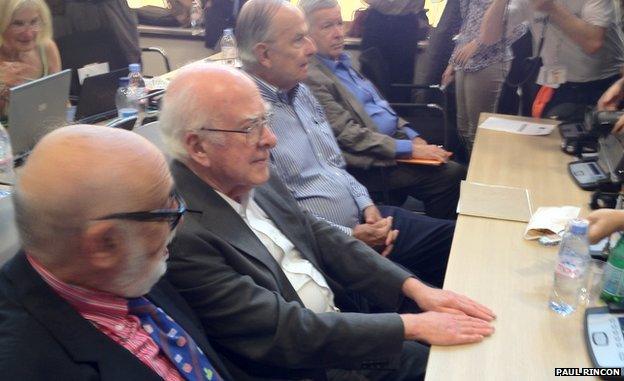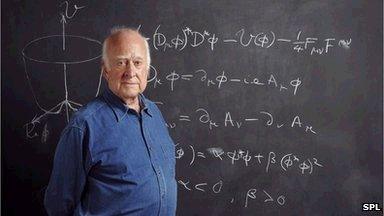Higgs boson: Call to rename particle to acknowledge other scientists
- Published

"Fathers" of the Higgs, L-R: Francois Englert, Peter Higgs, Carl Hagen and Gerald Guralnik
One of the scientists who helped develop the theory of the Higgs boson says the particle should be renamed.
Carl Hagen believes the name should acknowledge the work of others - not just UK physicist Peter Higgs.
The long-running debate has been rekindled following speculation that this year's Nobel Prize for Physics will be awarded for the Higgs theory.
The detection of a particle thought to be the Higgs was announced at the Large Hadron Collider in July last year.
American Prof Hagen told BBC News: "I have always thought that the name was not a proper one.
"To single out one individual marginalises the contribution of others involved in the work. Although I did not start this campaign to change the name, I welcome it."
Prof Peter Higgs developed a theory of how other sub-atomic particles came to have substance, or mass, and published his work in 1964.
However, other researchers independently came up with similar ideas and they, along with Prof Higgs, have long argued for the name of the particle to be changed.
People have spoken of key contributions being made by Francois Englert, Peter Higgs, Gerald Guralnik, Tom Kibble, Robert Brout and Carl Hagen. Five spoke at a press conference last year to announce the discovery of a particle thought to be the Higgs, but it was only Prof Higgs who received a huge round of applause from the researchers present.
"Peter Higgs was treated as something of a rock star and the rest of us were barely recognised by most of the audience. It was clear that Higgs was the dominant name because of the fact his name has become associated with the boson," Prof Hagen told BBC World News.
A spokeswoman from Cern - which operates the Large Hadron Collider - told BBC News that it was not up to the laboratory to determine the name of newly discovered particles.
"Particles have generally been named by theorists who predict them, an example being the 'quark'; or by experimentalists who discover unpredicted particles such as the neutron," she said.
"In all cases, the name eventually takes on common usage and is accepted by the particle physics community, and nowadays by the Particle Data Group who refer to Higgs bosons."
At a physics conference in March to discuss the discovery of the Higgs, researchers were encouraged to refer to the particle as the "SM Scalar Boson".

Peter Higgs is open to a name change to "H Boson"
At the time, it was thought that this was because physicists wanted to be absolutely sure that the claimed particle really was the Higgs before naming it as such.
Although six theorists are connected with developing the theory of the Higgs, many scientists believe that naming the particle after all of these individuals would be too much of a mouthful. Even acronyms created from the names of all six are inelegant. An example would be "BEHGHK", which would be pronounced "berk".
Prof Hagen, who is affiliated to the University of Rochester, New York, suggests that it be called the Standard Model Scalar Meson, or SM Squared.
Nobel Prize
A maximum of just three individuals can be named as winners of a Nobel Prize.
Those winners also have to be alive, and the five scientists who developed the Higgs theory that are still eligible for the award are in their 70s and 80s. Prof Brout died in 2011.
There is therefore considerable pressure on the Nobel committee determining the physics prize to award it for the Higgs before potential winners die.
But which three? Prof Hagen believes all six credited with the theory should be recognised along with the huge team of scientists and engineers at the LHC.
"It is unfortunate that the Nobel committee's bylaws prevent this. I hope some way can be found around it. If not then we will have to live with whatever decision is made".
Prof Jordan Nash, also at Imperial College London and who is among those who helped detect and characterise the particle at the LHC last year, said it might be impractical to change the name at this stage.
"I think it is healthy that the scientific community is having a careful look at the really groundbreaking work that was done by this group of scientists, especially now that we know their work 50 years ago has led to predicting something we can see experimentally.
"That said, the name of the 'Higgs particle' has been in common scientific use for decades.
"Names are given to predicted particles, and eventually one name sticks. This shouldn't been seen as a slight on the others who also contributed to developing this theory."
- Published10 April 2013
- Published4 July 2012
- Published6 July 2012
- Published4 July 2012
- Published4 July 2012